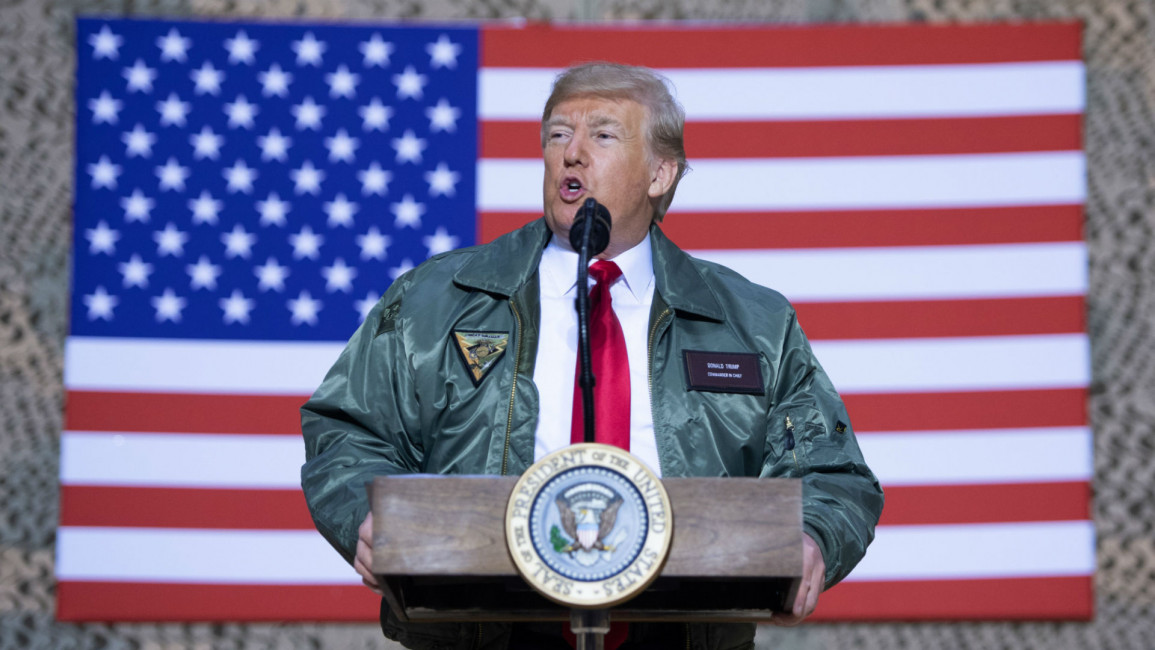Iraqis call for US troops to be expelled after Trump's remarks
US President Donald Trump's pledge on Sunday to keep American troops in Iraq has been condemned as "an insult" to national sovereignty, fuelling growing calls for Baghdad to expel "foreign forces".
Trump on Saturday said he wanted to keep American soldiers in Iraq to 'watch Iran', but official agreements between the US and Iraq limit their remit to fighting terrorist groups such as the Islamic State and providing training and tactical advice to Iraqi forces.
On Monday, Iraqi President Barham Salih told a forum in Baghdad that Trump did not ask Iraq's permission for US troops stationed there to "watch Iran".
Addressing Trump, Salih said: "Don't overburden Iraq with your own issues... The US is a major power... but do not pursue your own policy priorities, we live here".
American troops in Iraq are there as part of an agreement between the two countries with a specific mission of combating terrorism, Salih stressed, and that they should stick to that.
Speaking to CBS, Trump had said: "One of the reasons I want to keep it [US base in Iraq] is because I want to be looking a little bit at Iran because Iran is a real problem.
"I want to be able to watch Iran," he added, but denied he had plans to strike Iraq's neighbour.
 |
American military presence in Iraq is a sensitive topic, and a reminder to Iraqis of the dark chapter in their country after the US-led invasion and occupation of their country in 2003. |  |
Occupation or cooperation?
American military presence in Iraq is a sensitive topic, and a reminder to Iraqis of the dark chapter in their country after the US-led invasion and occupation of their country in 2003.
|
While US forces have been key to the rollback of the jihadis onslaught in Iraq in 2014, both independent and Iran-backed Iraqi political groups have been increasingly calling for ending foreign military deployment in the country.
US forces, whose exact numbers and locations in Iraq are not publicised, have also had run-ins with Iranian-backed Shia militias in the country, including over the weekend, and pro-Iran militias have threatened to target American forces in Iraq if they do not pull out soon.
"Members of parliament's security, defence and foreign relations committees are now working hard to determine the exact number and real mission of the US forces in Iraq," a high-level Iraqi government source told The New Arab's Arabic edition.
Last week, Ali al-Khazaai, an MP affiliated to Shia cleric Moqtada al-Sadr, told The New Arab his bloc was drafting a law designed to expel foreign forces from Iraq.
The proposed bill also enoys the support of Iranian-backed blocs in the parliament, The New Arab reported in December but pressure from the prime minister Adel Abdul-Mahdi has so far blocked it, as he tries to balance Baghdad's relations with its two rival allies, the US and Iran.
Trump's remarks that come weeks after the US president sparked outrage in Iraq by visiting US troops at Ain al-Asad base without meeting a single Iraqi official, are fuelling renewed calls for the expulsion of US forces.
Deputy speaker of parliament Hassan Karim al-Kaabi, who is also close to Sadr, told AFP the remarks were a "new provocation.
Officially, Iraq says there are no American bases on its soil – only instructors deployed at Iraqi bases.
American troops have been based in Iraq since the 2003 US-led invasion, which toppled dictator Saddam Hussein. At the height of its fight against the militants, it had up to 170,000 US troops in the country, before a partial withdrawal starting in late 2011.
Agencies contributed to this story



